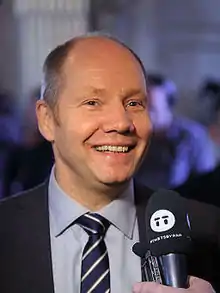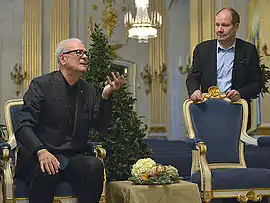Peter Englund
Peter Mikael Englund (born 4 April 1957) is a Swedish author and historian. Englund writes non-fiction books and essays, mainly about history. Especially about the Swedish Empire, but also about other historical events. He writes in a very accessible style, providing narrative details usually omitted in typical books about history. His books have gained popularity and are translated into several languages, such as German and Czech. He was the permanent secretary of the Swedish Academy from 1 June 2009 to 31 May 2015, when he was succeeded by Sara Danius.[1] In January 2019 Englund announced that he, and fellow academy member Espmark, would return as active members of the Swedish academy,[2] where they had been inactive since April 2018.[3]
Peter Englund | |
|---|---|
 Peter Englund in 2013 | |
| Born | April 4, 1957 |
| Alma mater | Uppsala University (Ph.D.) |
| Occupation | author and historian; former Permanent Secretary of the Swedish Academy |
| Children | 5 |
| Awards | August Prize (1993) Selma Lagerlöf Prize for Literature (2002) |
| Website | www |

Biography
Englund was born in Boden and studied a preparatory course for the caring professions for two years and then humanistic subjects for another two years in secondary school. He was then conscripted and served 15 months in the Swedish Army at the Norrbotten Regiment located in Boden. He was politically active in his youth and supported the National Front for the Liberation of Vietnam.
Englund studied archaeology, history, and theoretical philosophy at Uppsala University, completing a bachelor's degree in 1983, after which he began doctoral studies in History. He was awarded his Ph.D. in 1989 for his dissertation Det hotade huset (English title in the dissertation abstract: A House in Peril) (1989), an investigation of the worldview of the 17th-century Swedish nobility. During his period as a doctoral student, he had also worked for some time for the Swedish Military Intelligence and Security Service ("MUST"), and the year before receiving his doctorate he had published the bestselling Poltava, a detailed description of the Battle of Poltava, where the troops of Swedish king Charles XII were defeated by the Russian army of Tsar Peter I in 1709.
Englund has received the August Prize (1993) and the Selma Lagerlöf Prize for Literature (2002). He was elected a member of the Swedish Academy in 2002. On 1 June 2009, he succeeded Horace Engdahl as the permanent secretary of the Academy.
In 2009, perhaps to distance himself from Engdahl, the previous Nobel secretary, Englund, "criticized the jury panel as being too "Eurocentric,'" and "told the Associated Press that it was easier for Europeans to relate to European literature".[4] In December 2014, he announced his retirement from the post of secretary of the Swedish Academy,[5] and he was succeeded by Sara Danius May 31, 2015.[1] On 1 June 2015, Sara Danius succeeded Peter Englund as permanent secretary.[6]
On 6 April 2018, Englund announced that he would no longer participate in the Academy's work. On the same day, Klas Östergren and Kjell Espmark also declared that they would become inactive members of the Academy.[3]
On 10 January 2019, Englund announced on his blog that he and fellow Academy member Kjell Espmark would be returning as active members of the Academy. He stated that continued work to renew the Academy has now reached a point that it must be done from within.[7]
Bibliography
- Holowczyn: Battle of the Moscow Road (boardgame, 1980)[8]
- Peter the Great (boardgame, 1980)[8]
- Poltava ("Poltava") (1988)
- Det hotade huset ("A House in Peril") (1989)
- Förflutenhetens landskap ("The Landscape of Times Past") (1991), collection of essays
- Ofredsår ("Years of War") (1993), Sweden during Thirty Years' War with Erik Dahlberg at the centre of the book
- Brev från nollpunkten ("Letters from Ground Zero") (1996), collection of essays about modern history
- Den oövervinnerlige ("The Invincible") (2000), on Sweden's period as a Great Power. Sequel to Ofredsår
- Erik Lönnroth : inträdestal i Svenska akademien (2002)
- Tystnadens historia och andra essäer (2003)
- Jag skall dundra (2005)
- Tystnadens historia ("History of Silence") (2004), collection of essays
- Spegelscener : minnesfragment från fyra krig (2006)
- Silvermasken ("The Silver Mask") (2006), a short biography of Queen Kristina of Sweden
- Stridens skönhet och sorg ("The Beauty and the Sorrow") (2008), a biography-based book about 19 people who lived during World War I
- Det stora svalget : en finlandssvensk i första världskriget (2010)
- 1914 Stridens skönhet och sorg : Första världskrigets inledande år i 68 korta kapitel (2014)
- 1915 Stridens skönhet och sorg : Första världskrigets andra år i 108 korta kapitel (2015)
- 1916 Stridens skönhet och sorg (2015)
References
- Jan Arnald (2015). "Peter Englund's Biography at the Website of the Swedish Academy". Stockholm: The Swedish Academy. Archived from the original on July 6, 2015. Retrieved July 3, 2015.
- Radio, Sveriges. "Espmark och Englund återvänder till Akademien – Kulturnytt i P1". sverigesradio.se (in Swedish). Retrieved 2019-01-10.
- "Klas Östergren, Kjell Espmark och Peter Englund lämnar Svenska Akademien". Dagens Nyheter. 6 April 2018. Retrieved 6 April 2018.
- Herta Müller Wins Nobel Prize in Literature. By MOTOKO RICH and NICHOLAS KULISH. Published: 8 October 2009. NY Times
- Lindahl, Charlotte. "Peter Englund slutar som ständig sekreterare i Svenska Akademien" (in Swedish). SVT. Retrieved 2014-12-20.
- "Chair no. 7 – Sara Danius". Swedish Academy. Retrieved 6 April 2018.
- "Om Akademien". Peter Englund (in Swedish). 2018-04-23. Retrieved 2019-01-10.
- See http://www.boardgamegeek.com/designer/2962
External links
| Cultural offices | ||
|---|---|---|
| Preceded by Erik Lönnroth |
Swedish Academy, Seat No.10 2002– |
Succeeded by incumbent |

